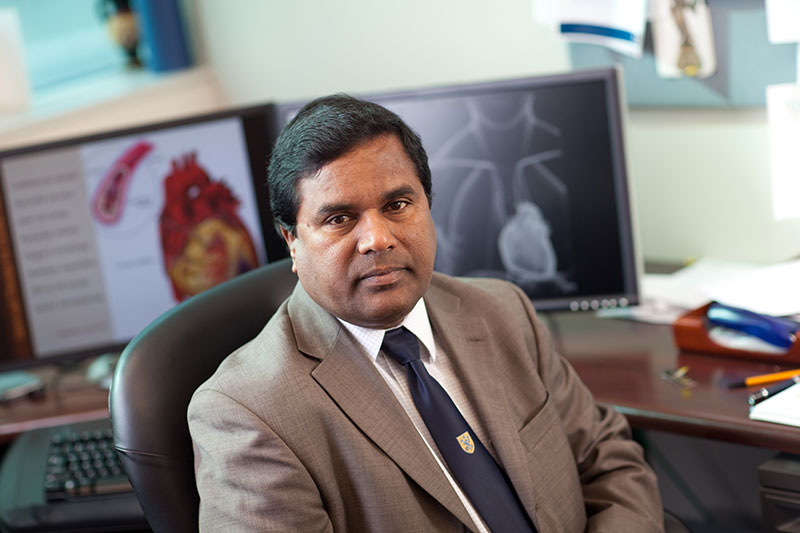For Release: October 3, 2013
Contact: Derik Hertel, (603) 650-1211 or Derik.Hertel@Dartmouth.edu
Dartmouth researcher finds a new role for the benefits of oxygen
Hanover, NH—In a study published in published in EMBO Molecular Medicine, a Dartmouth researcher found that dying heart cells are kept alive with spikes of oxygen.
During a heart attack when the flow of oxygen-rich blood to a section of the heart is interrupted, and not quickly restored, heart muscle begins dying. Deprived of oxygen and other essential nutrients, cell death continues occurring over a period of time leading to progressive loss of heart function and congestive heart failure.
Current therapies are not effective at limiting cell loss—they only slow down the progression of congestive heart failure.
Periannan Kuppusamy, PhD, professor of radiology at Geisel School of Medicine at Dartmouth, found that dying heart cells still contain enough oxygen for metabolism, and additional short-term spikes of oxygen keep the cells alive and active.
His research team used an animal model of acute myocardial infarction and discovered that daily administration of a higher concentration of oxygen for a short period of time each day induced spikes in myocardial oxygenation, which prevented myocardial injury.
"We all know that oxygen is crucial for survival, but it is intriguing to know that the same oxygen can be used like a drug to treat disease," Kuppusamy says.
Curious about the molecular mechanism of oxygen in treating myocardial injury, he began examining the effect of oxygen on p53, a transcription factor that regulates cell cycle and triggers programmed cell death. To his surprise he saw the 'oxygen spikes' altering the function of p53 from a death-inducing protein, to promoting transcription of genes that help dying cardiac cells survive.
Kuppusamy sees a link between the results of the present study to the age-old practice of breathing exercises for human well-being. He says, "Controlled breathing can increase tissue oxygenation, and if practiced on a daily basis, can lead to suppression of disease progression."
His research at Dartmouth also focusses on the effect of oxygen in cancer therapy.
To read the article, please visit EMBO Molecular Medicine.
The Geisel School of Medicine at Dartmouth, founded in 1797, strives to improve the lives of the communities it serves through excellence in learning, discovery, and healing. The nation's fourth-oldest medical school, the Geisel School of Medicine has been home to many firsts in medical education, research and practice, including the discovery of the mechanism for how light resets biological clocks, creating the first multispecialty intensive care unit, the first comprehensive examination of U.S. health care variations (The Dartmouth Atlas), and helping establish the first Center for Health Care Delivery Science, which launched in 2010. As one of America's top medical schools, Dartmouth's Geisel School of Medicine is committed to training new generations of diverse health care leaders who will help solve our most vexing challenges in health care.
# # #
